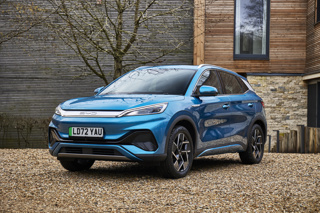Late last year Arval became the fourth contract hire and leasing company to pass the 100,000-vehicle threshold for risk fleet.
Growth has been steady, yet relentless, since Benoît Dilly was appointed UK managing director 16 months ago. “My mission statement was to grow the company,” he tells Fleet News.
However, there were no fixed targets to achieve or deadlines to hit. While other leasing companies are eager to set objectives in stone, Arval simply wants to fund more vehicles than it did the previous year.
When pushed, Dilly concedes that a business of Arval’s size should be looking for an “8%-9%” market share. However, he adds: “We have no plan to say we will get to 8% by 2018 – that’s not the point. But if we spend every day focusing on growth then we will grow.”
Does removing deadlines to achieve fixed targets alleviate pressure from the business? “No, this approach is more of a challenge,” Dilly replies.
“You challenge people more if you show them what’s available in the market and what you can achieve. If we set a target of 130,000, what if we could do 150,000?” he asks, suggesting that a fixed target risks putting a ceiling on progress.
“We want all parts of the business to grow. Our mindset is permanent momentum; we don’t say we’ve had enough growth for the year.”
Dilly’s one concession to a fixed target is his aspiration to outperform the market.
“To grow faster than the market is what a target means to me, but also faster than some of our competitors,” he says. “We keep an eye on those companies around us.”
He makes no secret of his desire to chase down the FN50 No2 and No3 companies, LeasePlan and Alphabet, although he has no designs on becoming the second biggest leasing provider in the UK. “Being number two, three or four doesn’t matter; it’s the market share that is the target.”
A 9% share of the FN50 currently equates to 120,000 risk fleet vehicles, giving an indication of the type of numbers Dilly has in mind, if not the timescales.
When he was appointed in September 2013, the company had a risk fleet of just over 85,500 for a share of around 5%; its growth since then averages at around 1,000 vehicles per month.
Dilly describes the moment the company reached 100,000 as “a proud achievement, more so because we have done it without acquisition – we have grown ourselves”.
In a move that says much about the company’s commitment to its staff, it held a huge party to celebrate.
The Arval business of today is divided into two operations: SME and corporate. SMEs are typically running fleets of up to 50 vehicles, although the figure isn’t prescriptive: more accurately, if the business wants a field-based sales relationship it is corporate; if it is phone and/or internet-based, it is SME.
The latter has accounted for the bulk of the growth, rising from 36,000 vehicles three years ago to 60,000 today. Arval has also successfully extended contracts and renewed agreements with existing customers in its corporate division, which now numbers 45,000 vehicles.
Progress has been slower in winning new business with corporates, though.
“Why? Our competitors are doing a good job!” Dilly says. “We recognise that the cost of change is high, so the company has to be convinced about it. But we have an aggressive view on winning more corporate business.”
However, retention of existing business remains a priority. “It’s cheaper and easier to retain than win,” Dilly says.
“Service quality is key so we focus on NPS , complaints management and strengthening our processes. We have had an outstanding performance: our renewal and retention rate has increased which tells me that our customers are happier today than they were.”
The greatest example of retention success can be seen with the notoriously price-sensitive, nay fickle, SME fleets. Via brokers, renewals have risen from 19% to 35% in the past 16 months; via Arval’s direct telesales arm, they have risen from 30% to 45%.
Arval’s current growth trajectory started with a major business upheaval, which began in 2010 with the introduction of a new Drive IT platform and the restructure of the account management teams (see fleetnews.co.uk/arval-restructure for details).
Drive was first introduced in the SME division, moving to corporate in 2012, explaining why SME growth has so far tracked ahead of corporate. That said, according to corporate sales director Andy Fuller, corporate grew every month last year from quarter two onwards.
“Over the past six to nine months, our proposition is seeing us being invited to have a conversation,” he says. “People are key in this sector and we have a full team now. Growth with large corporates is the last piece of the jigsaw.”
Arval’s priority is sole-supply deals, a policy which has been helped by recent economic conditions.
“Large corporates want value; they want a solution from their partners,” Fuller explains. “We have a strong consultancy operation but it’s hard to do that if you are one of two or three leasing providers. You have less engagement from customers in a multi-supply deal.”
He is looking for “aggressive growth” from ‘mid-corporates’ – fleets with up to 1,000 vehicles – but “conservative growth” from the largest fleets this year, building towards “significant growth” in 2016-17.
The role of Arval’s consultancy team has evolved in recent years, particularly within its existing customer base, according to Fuller’s colleague Elliott Woodhead, sales director – SME and partnerships.
“It’s not as easy to go into a large fleet, especially those with a fleet manager, and find huge savings, so the opportunities around consultancy aren’t as great,” he says.
“Now, it’s about consultants that are able to inform on legislation and technology, discuss market trends and what’s happening elsewhere, and plan activity throughout the contract, rather than simply identity process savings.”
Arval’s consultancy team has spent the past 18 months training its account managers so they can also use the advisory tools.
“We like the idea of live modelling with the customer rather than spending three months analysing their fleet and writing a report,” Fuller says.
While all these actions are readying the corporate division for growth, Woodhead’s SME operation has been expanding rapidly over the past three years. Its strength, he believes, rests on the fact that customers come from four channels: broker, direct, dealers and partnerships.
Broker is the largest, accounting for 38,000 units from 70 companies, some of which have been partners since Arval established the network 12 years ago.
“We have a strong relationship with our brokers: we give them a consultancy tool kit that measures their performance and compares it to their peer group, for example, renewal rates, maintenance penetration and credit acceptance,” says Woodhead. “This helps us to improve and forecast better, and it helps them to see how they can improve sales and earn more commission.”
Arval’s direct sales operation replicates the broker model internally via a telesales team at the Swindon head office, and adds 7,000 vehicles to the mix.
The SME division is completed by offering finance via dealers and white-label partnerships with manufacturers.
The final word goes to the man driving the business. “There are five areas where we are looking for growth: SMEs, corporates, new products, customer service and vans,” Dilly says.
“We have strengthened our processes, our organisation and our service-focused quality for our customers. We have the framework, the systems and the people to succeed.”























Login to comment
Comments
No comments have been made yet.